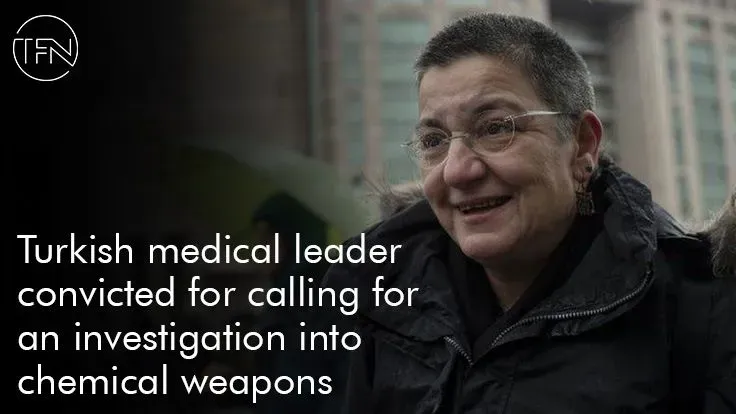The head of Turkey's medical association was found guilty of spreading propaganda for terrorists in connection with her plea for a probe into the army's alleged use of chemical weapons against Kurdish insurgents.
According to Turkish law, Dr. Sebnem Korur Fincanci is eligible for release despite serving a sentence of more than three years in jail.
She is expected to be freed on Wednesday after being held for more than two months.
Some claim that her imprisonment was an effort to silence her and other protesters.
Ms. Fincanci, a forensic specialist and well-known human rights champion, was jailed when she urged an unbiased investigation into claims that the Turkish military used illegal chemical weapons to target Kurdish insurgents in northern Iraq.
The PKK published a video in October that allegedly showed Turkish soldiers firing a weapon into a cave and the effects it had on a male and female fighter. Both the EU and the US consider the PKK to be a terrorist group. The group identified 17 of its members who, in their opinion, had just passed away due to such weaponry.
The Turkish government reportedly used chemical weapons to fight the PKK, and Ms. Fincanci was accused of spreading terrorist propaganda and disparaging Turkey.
She was given two years and eight months sentence on Wednesday after only three sessions and without what her advocates say to be due process. However, Turkey does not often impose sentences of less than three years.
In a brief address to the court at her previous hearing, Ms. Fincanci said that her prosecution was politically motivated and was meant to harm free speech and democratic norms.
According to BBC's Zeynep Erdim, who was there in court, the case was heard in a small room with a little over 100 people in attendance. Ms. Fincanci's supporters shouted repeatedly, "This is only the beginning, we will fight on," and "the Turkish Medical Association will not be silent."
Both local and international human rights groups saw the prosecution as an attempt to silence her and anybody else who dared to criticize the administration.
While expressing pleasure over Ms. Fincanci's release, Human Rights Watch spokeswoman in Turkey Emma Sinclair noted that her case "sends a forceful message to everyone to stay silent."
Ms. Sinclair also raised concern for the other Medical Association of Turkey (TTB) board members who, if found to be terrorist group members, would face the same sentence.
Ms. Fincanci's readmission to the organization, according to a tweet from the Medical Association, denotes that she "will play our role at the turning point in front of our country."
"We'll make sure that neither the TTB nor our country succumbs to the shadows, it goes on."
According to a new media law, Turkey enacted last year, distributing false information about Turkish security that "stokes alarm and disrupts public order" may result in jail terms of up to three years. Amnesty International termed the bill "another sad day for online freedom of expression and press freedom in Turkey."
Additionally, several Western countries have voiced their discontent with the Turkish legal system. The US State Department has previously criticized Turkish justice harshly, alleging that there has been "continued judicial harassment of civil society, media, and political leaders" – particularly in the wake of the life sentence given to renowned philanthropist and activist Osman Kavala last April. The US State Department has voiced grave worry about Turkey's assertion that its judiciary is independent.
Recep Tayyip Erdogan, the president, has increased his grip over media outlets in recent years. In Turkey, a "disinformation law" was put into effect in October, subjecting anyone convicted of spreading "false news" to sentences of up to three years in jail. According to Reporters Without Borders' 2022 World Press Freedom Index, Turkey placed 149th out of 180 nations.
There are concerns that Mr. Erdogan might further stifle free speech given that he is running for president and the parliament this year.

